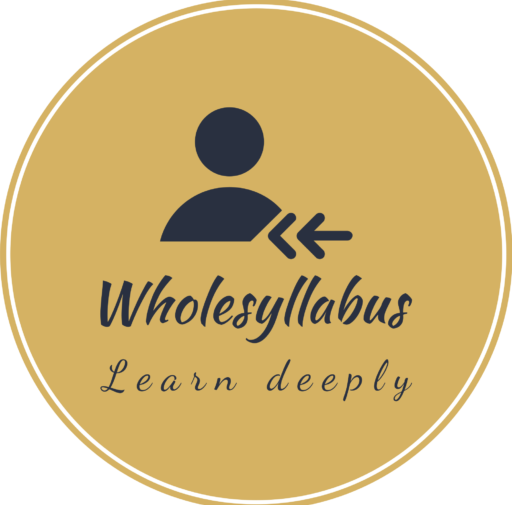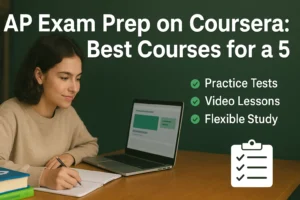If you’re aiming for a 5 on your AP exam, starting your prep early makes a huge difference. Many students rely only on school lectures or a stack of prep books, but here’s the truth: the most successful students usually add structured online learning to the mix. That’s where Coursera comes in.
I’ve spent years researching tools for high school students, and one pattern stands out — students who combine classroom learning with flexible online courses (like those on Coursera) often feel more confident and prepared when exam season hits.
Parents on forums like r/APStudents and even College Board’s advice pages say the same: pacing your prep with extra resources boosts your chances of hitting that top score.
Quick Answer: Can Coursera Really Help with AP Exam Prep?
Yes. Coursera offers subject-specific courses in math, science, history, psychology, and more — many of which line up with AP exam topics.
These courses are taught by professors from universities like Yale, Stanford, and Michigan, and they’re flexible enough to fit around a busy high school schedule.
For students aiming for a 5, Coursera works best as a supplement: it helps you master tough concepts, stay consistent with practice, and build confidence before test day.
In my opinion, Coursera isn’t a magic shortcut — but if you start using it in the fall, it can feel like having a personal tutor available 24/7.
📌 Quick Tip: If you’re not sure when to begin, check our guide: When to Start Studying for AP Exams →
Why Choose Coursera for AP Exam Prep?
Short answer: Coursera combines expert-led classes with flexible pacing, making it easier to stay consistent than with unstructured free resources.
- Expert instruction: Courses designed by Yale, Stanford, Michigan, and more.
- Structured learning: Weekly modules keep you on track.
- Affordable: Much cheaper than tutoring ($59/month vs. $100/hour tutors).
- Certificates: Can boost college applications.
Honestly, free tools like Khan Academy are great, but Coursera feels more official and disciplined if you want accountability.
Browse Coursera’s Student Courses →
Best Coursera Courses for Popular AP Exams
Quick answer: Coursera doesn’t label courses as “AP,” but many align directly with AP exam subjects.
Here’s a breakdown of the best Coursera picks for AP exams:
AP Calculus AB & BC
- Calculus: Single Variable – University of Pennsylvania
- Integral Calculus – University of Sydney
Why it helps: AP Calc requires practice and structured theory. These courses make hard concepts digestible.
| Coursera Course | Why It Helps for AP | Pros | Cons |
|---|---|---|---|
| Calculus: Single Variable (University of Pennsylvania) | Covers limits, derivatives, integrals — core AP Calc AB topics | Clear lectures, strong problem sets, Ivy League credibility | May feel advanced if you haven’t taken precalc |
| Integral Calculus (University of Sydney) | Deeper dive into integrals, sequences, series (AP Calc BC level) | Great for students aiming for BC | Not designed for total beginners |
👉 Recommendation: Take Single Variable in fall, then Integral Calculus closer to spring if you’re going for BC.
AP Biology
- Introduction to Biology – MITx
- Cell Biology Basics – University of Geneva
Why it helps: Great for complex AP Bio topics like genetics and respiration. On Reddit’s r/APStudents, students often cite these as pain points.
| Coursera Course | Why It Helps for AP | Pros | Cons |
|---|---|---|---|
| Introduction to Biology (MITx) | Broad coverage of cell biology, genetics, ecology | Matches AP units, high academic credibility | Some sections may feel deeper than AP level |
| Cell Biology Basics (University of Geneva) | Zooms in on cells, organelles, energy cycles | Shorter, easier to digest | Limited coverage outside cell topics |
👉 Recommendation: Use Intro to Biology as your main prep, then Cell Biology Basics for tricky exam units like respiration.
AP U.S. History & Government
- American History: From Colonization to Civil War – Columbia University
- U.S. Constitutional Foundations – Penn
Why it helps: Complements APUSH with engaging historical storytelling.
| Coursera Course | Why It Helps for AP | Pros | Cons |
|---|---|---|---|
| American History: From Colonization to Civil War (Columbia University) | Contextual deep dive into early US history | Helps APUSH essay writing, Ivy League source | Doesn’t cover modern APUSH (post–Civil War) |
| U.S. Constitutional Foundations (University of Pennsylvania) | Focus on U.S. Government and AP Gov content | Great for AP Gov essay skills | Narrow scope — not full APUSH |
👉 Recommendation: Pair one history course with a government one to cover both APUSH and AP Gov overlap.
AP Psychology
- Introduction to Psychology – Yale University
👉 Why it helps: Yale’s Psych course is clear, fun, and covers AP concepts like conditioning, cognition, and behavior.
| Coursera Course | Why It Helps for AP | Pros | Cons |
|---|---|---|---|
| Introduction to Psychology (Yale University) | Comprehensive overview of psychology theories & studies | Covers AP Psych curriculum almost directly | Fast-paced, may overwhelm total beginners |
👉 Recommendation: This Yale course is practically built for AP Psych students — highly recommended.
AP Statistics & Computer Science
- Intro to Statistics – Stanford University
- Python for Everybody – University of Michigan
👉 Why it helps: Stats and CS exams reward analytical thinking, which these courses sharpen.
| Coursera Course | Why It Helps for AP | Pros | Cons |
|---|---|---|---|
| Intro to Statistics (Stanford University) | Probability, distributions, regression — key AP Stats topics | University-level rigor, clear examples | Some advanced content beyond AP scope |
| Python for Everybody (University of Michigan) | Beginner-friendly coding that matches AP CS Principles | Easy to follow, real-world coding projects | Doesn’t exactly follow AP CS A Java curriculum |
Recommendation: Stats students should focus on the Stanford course. For AP CS Principles, Python for Everybody is perfect; for AP CS A, supplement with Java resources.
Explore More Coursera Courses for Students →
When Should You Start AP Exam Prep on Coursera?
Quick answer: Start in the fall to build basics, use winter for practice, and review in spring before May exams.
- Fall (Sept–Nov): Build foundations.
- Winter (Dec–Feb): Deepen with Coursera quizzes + AP classwork.
- Spring (Mar–Apr): Focus on mock exams + final review.
Align your prep with the 2026 AP Exam Schedule →
Tool: Want a personalized plan? Try our Free AP Study Schedule Maker →
How to Combine Coursera with Traditional AP Prep
Short answer: Use Coursera for structured lessons and the College Board for practice exams.
Here’s a solid mix:
- Use Coursera for complex lessons (like calc integrals or AP Bio genetics).
- Practice with College Board past questions.
- Plan study time using Best Study Planners for Students →.
- Join school study groups + Coursera forums.
On Quora and Reddit, many AP students said Coursera “filled the gaps” when teachers rushed topics.
Check Out Study Tools That Pair with Coursera →
Is Coursera Free for AP Students? (Financial Aid Explained)
Quick answer: Yes, Coursera offers financial aid. But you have to apply — it’s not automatic.
- Apply directly from the course page.
- Takes 15–20 minutes.
- Approval in ~2 weeks.
Most parents miss this detail: you must apply early.
🔗 Read our step-by-step: Coursera Financial Aid Application Guide →
Tips to Score a 5 Using Online Courses
Quick answer: Consistency beats cramming. Start early, mix Coursera with AP tests, and review often.
Tips that work:
- Begin prep 6–8 months before exam.
- Use flashcards & spaced repetition.
- Take at least two timed practice exams.
- Don’t skip free-response practice — it’s what separates 4s from 5s.
If stress gets in the way, read: How to Not Stress About AP Exams →
📌Explore AP-Friendly Coursera Courses →
FAQ Section for AP Exam Prep on Coursera
❓ What is the best way to prepare for AP exams?
The best approach is a mix: follow your school’s AP curriculum, practice with College Board resources, and add structured online learning. Platforms like [Coursera] offer expert-led courses that match AP subjects, which helps students review concepts at their own pace.
❓ How to get a 5 on any AP exam?
Scoring a 5 requires:
Consistent study (6–8 months).
At least 2–3 full practice exams.
Reviewing weak areas using structured resources like Coursera courses.
Honestly, most students who hit a 5 combine school notes + online review.
❓ Are Coursera certificates valid?
Yes. Coursera certificates are recognized by universities and employers. While they don’t replace an AP score, they look great on college applications and resumes.
❓ Which Google Coursera course is best for students?
Google’s IT Support and Data Analytics certificates are among the most popular on Coursera. For high schoolers, I’d recommend Google Data Analytics — it builds real-world skills alongside AP coursework.
❓ Which is the hardest AP exam?
Traditionally, AP Physics 1 and AP U.S. History (APUSH) are considered the hardest due to low pass rates. If you’re taking these, pairing with Coursera courses in Physics or U.S. History can give extra support.
❓ Which is the easiest AP exam?
Many students find AP Psychology and AP Environmental Science more approachable. Even so, taking an intro course on Coursera can help you secure a top score without much stress.
Final Thoughts – Why Coursera Can Help Your Teen
Looking back, I know how overwhelming AP season can feel — not just for students but for parents, too. Most teens don’t struggle with ability, they struggle with structure.
That’s where Coursera really helps: it gives them expert-led lessons, pacing, and accountability without the cost of private tutoring.
If you’re a parent, think of it as a support system that keeps your teen on track while easing the stress in your home. Pair it with practice exams and a clear study plan, and your child will be in a much stronger position for that 5.
👉 Explore Coursera Courses for AP Prep →
Not sure whether Coursera or Khan Academy is better for AP prep? We cover both in this head-to-head comparison — take a look: Coursera vs. Khan Academy.

Nawab, an educator teaching K-12 since 2010, holds an English honors graduate degree and a diploma in elementary education. He has also been blogging for five years, sharing insights for educators and parents.

